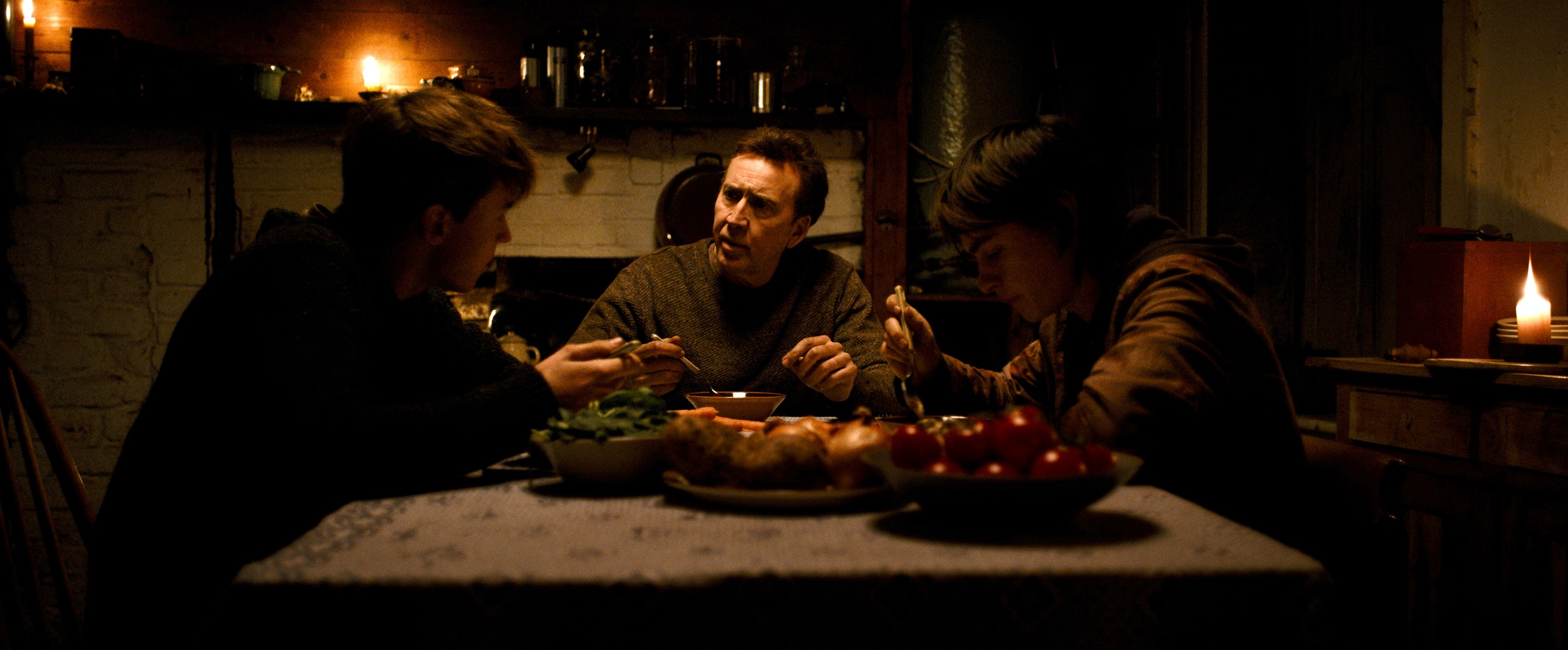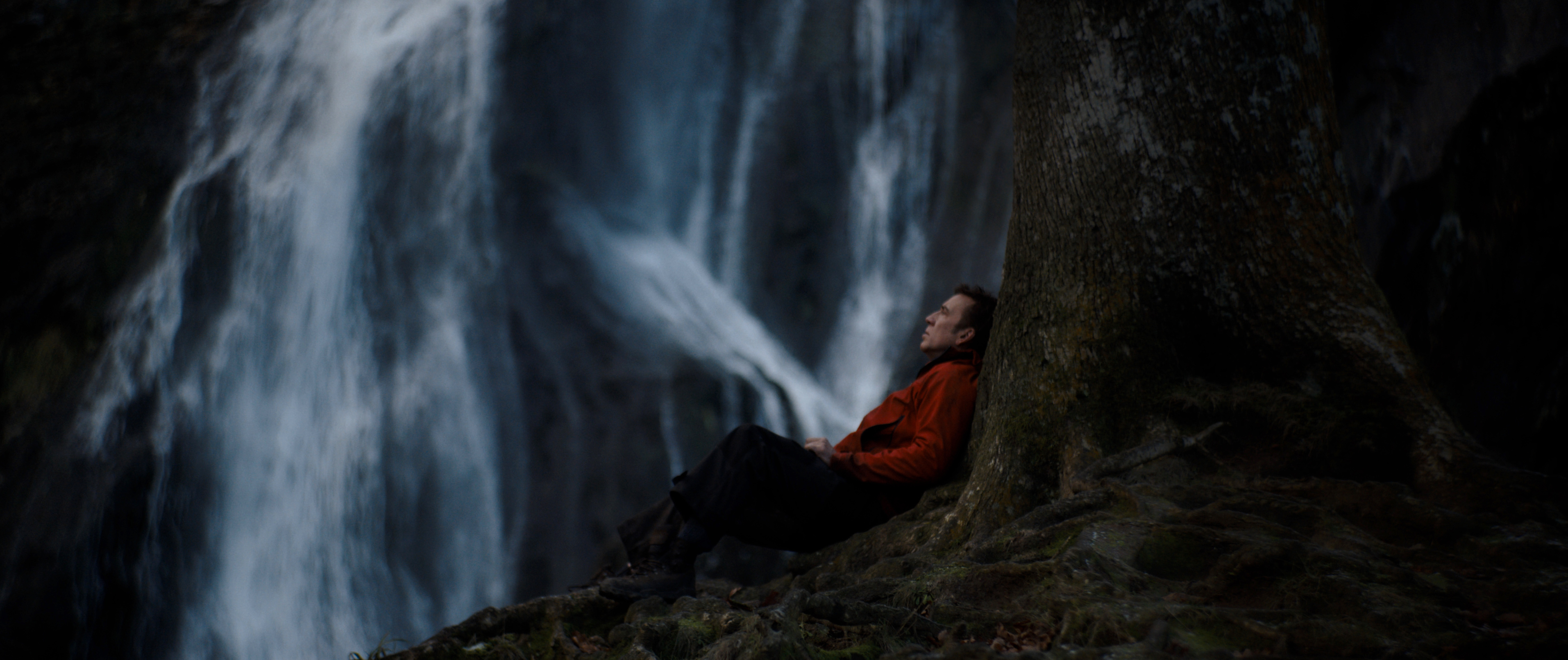Benjamin Brewer’s post-apocalyptic, Nic Cage-starring creature feature finds a sombre interest in fatherhood and growing up in screenwriter Michael Nilon’s bleak scenario, after Paul (Cage) gathers up two abandoned babies with black smoke blooming, and a city falling into catastrophe.
Fifteen years later, adopted siblings Joseph (It’s lead kid Jaeden Martell) and Thomas (Maxwell Jenkins) live in a farmhouse under Paul’s sternly loving tutelage, foraging by day, and cowering when night brings monsters scratching at their door, much like A Quiet Place or a vampire flick. Arcadian was filmed around Dublin, and its colours are often washed out, with gloomy green fields, as if the future itself has faded.
Cage has refocused his energies since financial ruin required a prolific late phase mixing the intense, heartfelt likes of Joe (2013) and Pig (2021) with bug-eyed B-movie turns, as if flipping between Brando’s genius/hack coin, and pining to fuse the two. He’s out of action for much of this film, which, one crowd-pleasing intervention aside, sees him settle for stoic, restrained strength, and the weary need to shield his sons from the end of the known world. Brewer keeps to classic low-budget, limited terrain, with careless, headstrong brother Thomas courting the neighbouring farmer’s daughter, Charlotte (Sadie Soverall), at his diurnal existence’s far border. Quiet, clever Joseph meanwhile fixes a vehicle to speed their exploring, and imagines adulthood with his family no longer trapped by the bad-dream critters who rule the night.
Brewer keeps to classic low-budget, limited terrain, with careless, headstrong brother Thomas courting the neighbouring farmer’s daughter, Charlotte (Sadie Soverall), at his diurnal existence’s far border. Quiet, clever Joseph meanwhile fixes a vehicle to speed their exploring, and imagines adulthood with his family no longer trapped by the bad-dream critters who rule the night.
The fall of our civilisation has become a myth for Arcadian’s young. The night-stalkers are said to result from environmental breakdown, maybe antibodies to scour Earth of our poison. Arcadian’s title implies a rustic, pre-industrial utopia, the prelapsarian idyll already mourned by Thoreau when America was young. Paul’s family eat healthy food, read and write, technology’s collapse clearly having an upside. It’s the opposite of Terminator 2’s Skynet cataclysm, a return to an un-American world with a day’s slow journey to the next hamlet as the frontier. No wonder Joseph wants out. Arcadian’s interest in its family microcosm doesn’t forget the monsters. They’re barely seen at first, and never grasped whole: one long hand unfurling through a peephole, queasily stretching into a probing needle, and unlocking the door; big, furry spider-legs behind that, yet bestial as much as insectile, with a Lovecraftian maw, noisily vibrating when it prepares to pounce and squat, sucking, on its prey. As devastated societies from Day of the Triffids to The Walking Dead also attest, rival human survivors are worse.
Arcadian’s interest in its family microcosm doesn’t forget the monsters. They’re barely seen at first, and never grasped whole: one long hand unfurling through a peephole, queasily stretching into a probing needle, and unlocking the door; big, furry spider-legs behind that, yet bestial as much as insectile, with a Lovecraftian maw, noisily vibrating when it prepares to pounce and squat, sucking, on its prey. As devastated societies from Day of the Triffids to The Walking Dead also attest, rival human survivors are worse.
Thomas’s desire to catch and study a beast hints at Clive Barker’s revolutionary horror ethos of loving the alien, freak and monster. Arcadian settles for the easier, Stephen King school of terminating the weird with extreme prejudice. Filming in Ireland also gives a sense of old European forest fears, while the besieged farmhouse recalls pioneers and Apache.
Arcadian’s intriguing premise loosens once Cage leaves the screen, and slack plot and action beats swamp its essence. Charlotte’s intrusion on the happy male home, breaking up the band as much as the monsters, makes this an underwritten coming of age story, too, as its heroes consider what else may be left of their world, and the old fall, barely remarked, into the past.















Add comment